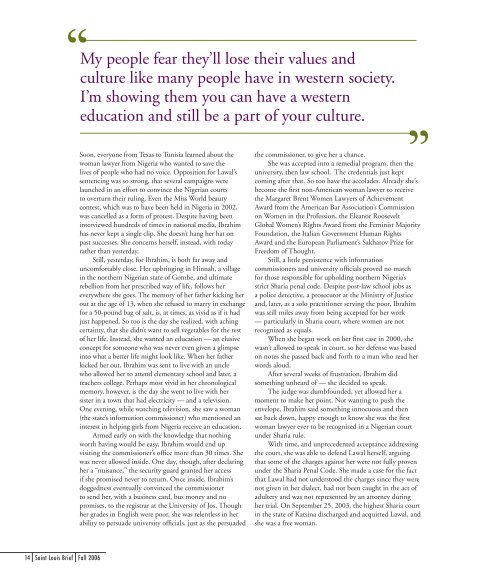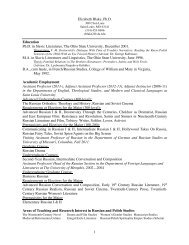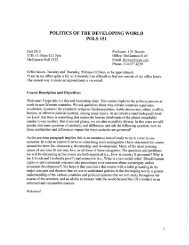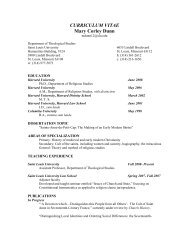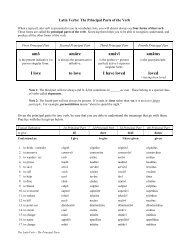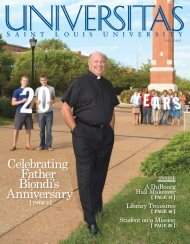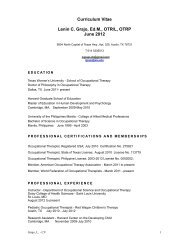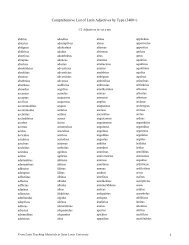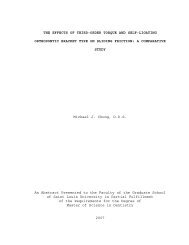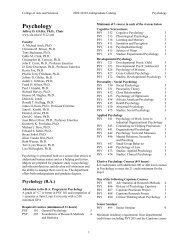willkommen in - Saint Louis University
willkommen in - Saint Louis University
willkommen in - Saint Louis University
Create successful ePaper yourself
Turn your PDF publications into a flip-book with our unique Google optimized e-Paper software.
“ My people fear they’ll lose their values and<br />
culture like many people have <strong>in</strong> western society.<br />
I’m show<strong>in</strong>g them you can have a western<br />
education and still be a part of your culture.<br />
Soon, everyone from Texas to Tunisia learned about the<br />
woman lawyer from Nigeria who wanted to save the<br />
lives of people who had no voice. Opposition for Lawal’s<br />
sentenc<strong>in</strong>g was so strong, that several campaigns were<br />
launched <strong>in</strong> an effort to conv<strong>in</strong>ce the Nigerian courts<br />
to overturn their rul<strong>in</strong>g. Even the Miss World beauty<br />
contest, which was to have been held <strong>in</strong> Nigeria <strong>in</strong> 2002,<br />
was cancelled as a form of protest. Despite hav<strong>in</strong>g been<br />
<strong>in</strong>terviewed hundreds of times <strong>in</strong> national media, Ibrahim<br />
has never kept a s<strong>in</strong>gle clip. She doesn’t hang her hat on<br />
past successes. She concerns herself, <strong>in</strong>stead, with today<br />
rather than yesterday.<br />
Still, yesterday, for Ibrahim, is both far away and<br />
uncomfortably close. Her upbr<strong>in</strong>g<strong>in</strong>g <strong>in</strong> H<strong>in</strong>nah, a village<br />
<strong>in</strong> the northern Nigerian state of Gombe, and ultimate<br />
rebellion from her prescribed way of life, follows her<br />
everywhere she goes. The memory of her father kick<strong>in</strong>g her<br />
out at the age of 13, when she refused to marry <strong>in</strong> exchange<br />
for a 50-pound bag of salt, is, at times, as vivid as if it had<br />
just happened. So too is the day she realized, with ach<strong>in</strong>g<br />
certa<strong>in</strong>ty, that she didn’t want to sell vegetables for the rest<br />
of her life. Instead, she wanted an education — an elusive<br />
concept for someone who was never even given a glimpse<br />
<strong>in</strong>to what a better life might look like. When her father<br />
kicked her out, Ibrahim was sent to live with an uncle<br />
who allowed her to attend elementary school and later, a<br />
teachers college. Perhaps most vivid <strong>in</strong> her chronological<br />
memory, however, is the day she went to live with her<br />
sister <strong>in</strong> a town that had electricity — and a television.<br />
One even<strong>in</strong>g, while watch<strong>in</strong>g television, she saw a woman<br />
(the state’s <strong>in</strong>formation commissioner) who mentioned an<br />
<strong>in</strong>terest <strong>in</strong> help<strong>in</strong>g girls from Nigeria receive an education.<br />
Armed early on with the knowledge that noth<strong>in</strong>g<br />
worth hav<strong>in</strong>g would be easy, Ibrahim would end up<br />
visit<strong>in</strong>g the commissioner’s office more than 30 times. She<br />
was never allowed <strong>in</strong>side. One day, though, after declar<strong>in</strong>g<br />
her a “nuisance,” the security guard granted her access<br />
if she promised never to return. Once <strong>in</strong>side, Ibrahim’s<br />
doggedness eventually conv<strong>in</strong>ced the commissioner<br />
to send her, with a bus<strong>in</strong>ess card, bus money and no<br />
promises, to the registrar at the <strong>University</strong> of Jos. Though<br />
her grades <strong>in</strong> English were poor, she was relentless <strong>in</strong> her<br />
ability to persuade university officials, just as she persuaded<br />
”<br />
the commissioner, to give her a chance.<br />
She was accepted <strong>in</strong>to a remedial program, then the<br />
university, then law school. The credentials just kept<br />
com<strong>in</strong>g after that. So too have the accolades. Already she’s<br />
become the first non-American woman lawyer to receive<br />
the Margaret Brent Women Lawyers of Achievement<br />
Award from the American Bar Association’s Commission<br />
on Women <strong>in</strong> the Profession, the Eleanor Roosevelt<br />
Global Women’s Rights Award from the Fem<strong>in</strong>ist Majority<br />
Foundation, the Italian Government Human Rights<br />
Award and the European Parliament’s Sakharov Prize for<br />
Freedom of Thought.<br />
Still, a little persistence with <strong>in</strong>formation<br />
commissioners and university officials proved no match<br />
for those responsible for uphold<strong>in</strong>g northern Nigeria’s<br />
strict Sharia penal code. Despite post-law school jobs as<br />
a police detective, a prosecutor at the M<strong>in</strong>istry of Justice<br />
and, later, as a solo practitioner serv<strong>in</strong>g the poor, Ibrahim<br />
was still miles away from be<strong>in</strong>g accepted for her work<br />
— particularly <strong>in</strong> Sharia court, where women are not<br />
recognized as equals.<br />
When she began work on her first case <strong>in</strong> 2000, she<br />
wasn’t allowed to speak <strong>in</strong> court, so her defense was based<br />
on notes she passed back and forth to a man who read her<br />
words aloud.<br />
After several weeks of frustration, Ibrahim did<br />
someth<strong>in</strong>g unheard of — she decided to speak.<br />
The judge was dumbfounded, yet allowed her a<br />
moment to make her po<strong>in</strong>t. Not want<strong>in</strong>g to push the<br />
envelope, Ibrahim said someth<strong>in</strong>g <strong>in</strong>nocuous and then<br />
sat back down, happy enough to know she was the first<br />
woman lawyer ever to be recognized <strong>in</strong> a Nigerian court<br />
under Sharia rule.<br />
With time, and unprecedented acceptance address<strong>in</strong>g<br />
the court, she was able to defend Lawal herself, argu<strong>in</strong>g<br />
that some of the charges aga<strong>in</strong>st her were not fully proven<br />
under the Sharia Penal Code. She made a case for the fact<br />
that Lawal had not understood the charges s<strong>in</strong>ce they were<br />
not given <strong>in</strong> her dialect, had not been caught <strong>in</strong> the act of<br />
adultery and was not represented by an attorney dur<strong>in</strong>g<br />
her trial. On September 25, 2003, the highest Sharia court<br />
<strong>in</strong> the state of Kats<strong>in</strong>a discharged and acquitted Lawal, and<br />
she was a free woman.<br />
Victories like this are what Hauwa Ibrahim lives for,<br />
but even after all the lives she’s saved, her own must surely<br />
be shadowed by a t<strong>in</strong>y black cloud. No one <strong>in</strong> her family<br />
has ever acknowledged her efforts.<br />
“I know I’m operat<strong>in</strong>g <strong>in</strong> an environment that<br />
doesn’t accept what I’m do<strong>in</strong>g,” says Ibrahim. “I’m quite<br />
used to it. My family th<strong>in</strong>ks what I’m do<strong>in</strong>g is wrong.<br />
I rebelled to go to school, to get someth<strong>in</strong>g done <strong>in</strong> my<br />
community. I rebelled and married a white man, an<br />
act that has never been mentioned <strong>in</strong> my community<br />
(it’s taboo because of the color of his sk<strong>in</strong>). I have done<br />
everyth<strong>in</strong>g on the negative of what I was brought up to<br />
do. If they don’t accept me, I perfectly understand.”<br />
Despite her lack of acceptance, she refuses to turn her<br />
back on her culture.<br />
“I don’t spite my people,” she says. “When I go back,<br />
I behave like a typical villager. I dr<strong>in</strong>k the water, eat the<br />
food and dress like my people. I want them to know I<br />
came from this place and have not changed. I want to<br />
send a message to the girls there that they can become<br />
someth<strong>in</strong>g. My people fear they’ll lose their values and<br />
culture like many people have <strong>in</strong> western society. I’m<br />
show<strong>in</strong>g them you can have a western education and still<br />
be a part of your culture.”<br />
Ibrahim’s message has not fallen on deaf ears.<br />
“When I was grow<strong>in</strong>g up, when a woman gave birth,<br />
the men would say, ‘Your wife has put to bed. Does she<br />
have a prostitute or a soldier?’ A soldier is a symbol of<br />
strength and that’s how people classified a male child. Now<br />
you don’t hear that, which I th<strong>in</strong>k is a huge change. I’ve<br />
even known a few people who have named their daughters<br />
after me. Some have even been <strong>in</strong>sulted by the fact that<br />
they have boys. ‘Look at Hauwa,’ they say, ‘I wish I had a<br />
girl like her.’ These are all slight, but powerful changes. I<br />
hope that will help more of my people come to accept that<br />
women are not bad as they were once thought to be.”<br />
If just one th<strong>in</strong>g can be learned from Ibrahim’s<br />
tortuous path through life, it’s that anyth<strong>in</strong>g is possible<br />
with hard work and a lot of faith. And while everyth<strong>in</strong>g we<br />
know about the world seems contrary to her belief that all<br />
of us are armed with the power to make the world a better<br />
place, when you hear the words escape her mouth, the idea<br />
seems perfectly possible.<br />
“We, as <strong>in</strong>dividuals <strong>in</strong> any country, really do have<br />
what it takes to change the world for the better,” she<br />
asserts. “I believe I’m one of the billions of people across<br />
the globe that can play my part. One part I’ve played is to<br />
speak out. I act. I do. I don’t live for past glory. I always<br />
ask myself, ‘What can I do today that is different?’ All of<br />
us play different roles <strong>in</strong> our little corners of the world by<br />
either mak<strong>in</strong>g the world a good place or a bad place.”<br />
You don’t need ten or two or three people to make<br />
that difference, Ibrahim says. All you need is just one<br />
person to change their perspective.<br />
“If you just smile at a person, even if he doesn’t<br />
smile at you, you can be responsible for giv<strong>in</strong>g someone<br />
a good beg<strong>in</strong>n<strong>in</strong>g to their day,” she notes. “We need to<br />
know the power we have and we need to use it.<br />
We all have it. When we keep on do<strong>in</strong>g that, the world<br />
will get better.”<br />
Sa<strong>in</strong>t <strong>Louis</strong> Brief Fall 2006 Fall 2006 Sa<strong>in</strong>t <strong>Louis</strong> Brief<br />
photo by Jay Fram


